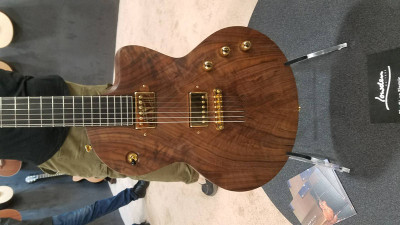Your Guide to Exotic Wood Used in Guitar Building
28th Jun 2018

A lot goes into creating a guitar. Although it's simply wood and strings, the type of exotic wood used and how it's treated plays a big part in the construction and sound quality.
Different types of exotic wood are better for either electric or acoustic guitars and also for the various parts of the instrument.
The best types of exotic wood for guitars depend on what the luthier is wanting. Read on to learn more about the guitar wood types, what they are used for, and how they affect the sound.
Maple
Maple wood is a hardwood that is often used to make guitar necks. This wood has good tonal qualities andthe note is sustained after it's released.
It's also a very beautiful wood, often used for the guitar body. Guitars made of maple wood have a bright sound.
Mahogany
Mahogany comes in a number of varieties and is quite popular for making wood instruments. Mahogany guitars have a warm timbre with a lot of bottom end.
If you are lucky enough to have an older Les Paul guitar made of mahogany, it's likely to be made of a mahogany that no longer exists.
Basswood
Basswood is made from Linden trees. It's a good guitar wood because it's pliable, making the wood easy to work with and shape.
One downside is that because it's a softer wood, it's susceptible to dents. It's not the prettiest wood but is a great choice for painted guitars.
Like maple, it has a good sustain and offers a warm, balanced tone with a wonderful midrange.
Alder
A lot of Fender guitars from the 1950s and 1960s are made from Alder.
Since it's now expensive and hard to come by, Alder is not a popular guitar wood choice today.
It's a lightweight wood that has beautiful grain patterns and offers a warm sound with lots of highs but less midrange and bass.
Swamp Ash
Swamp Ash, like Alder, is a pretty and lightweight wood. It's a popular guitar wood type with American-made guitars.
It has a lovely timbre, good sustain, and firm bass tones. The midrange has a bite and the highs are airy.
Rosewood
Rosewood is traditionally used for fretboards and is often combined with a maple neck but offers a darker tone.
It's a hardwood that can withstand lots of human contact. It's being used less and less now, due to import restrictions.
Ebony
Ebony is another popular wood used for fretboards. However, it's more rare and expensive than even Rosewood.
Ebony is mostly used on fretless guitars because of its durability.
Spruce
There are several different kinds of Spruce woods, offering different tones. The different spruce guitar wood options include:
- Sitka--it the most popular due to its availability and good quality tone and range
- Engelmann--a bit more expensive than Sitka, because it's rarer and has stronger overtones
- Lutz--most Taylor guitars are made with Lutz.
- Adirondack--hard to come by, it offers a complex tone like no other guitar wood
- Western Red Collar--a popular choice for classical guitar wood
Spruce is the best wood for acoustic guitars.
Exotic Wood for Guitars
This guide is by no means an exhaustive list but is a sampling of some of the most popular wood choices for both electric and acoustic guitars.
No doubt the wood options will continue to change, just as they have over the years, mostly due to wood varieties being overused and sometimes going extinct.
For that reason, when choosing a wood for a guitar, it's important to keep in mind sustainability and its effect on the environment.
For more great articles about interesting and practical uses for exotic wood, visit our blog.
Global Wood Source is a family owned and operated lumber yard and mill specializing in exotic woods from around the world and rare domestics. We personally acquire and inspect each piece of log and timber obtained from forests and jungles worldwide.

